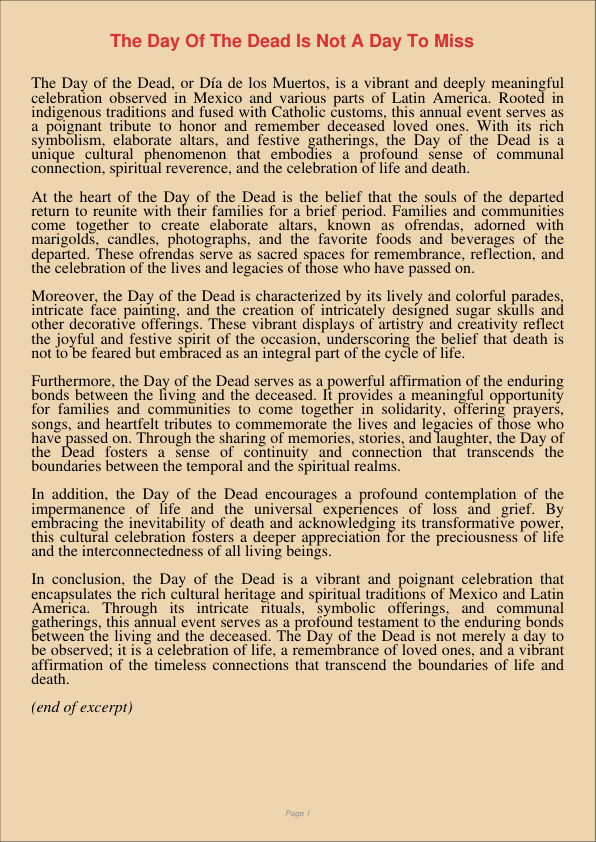The Day Of The Dead Is Not A Day To Miss
Jan 7, 2024
miss
dead
Journalism & Communication
Biology
The Day of the Dead, or Día de los Muertos, is a vibrant and deeply meaningful celebration observed in Mexico and various parts of Latin America. Rooted in indigenous traditions and fused with Catholic customs, this annual event serves as a poignant tribute to honor and remember deceased loved ones. With its rich symbolism, elaborate altars, and festive gatherings, the Day of the Dead is a unique cultural phenomenon that embodies a profound sense of communal connection, spiritual reverence, and the celebration of life and death.
At the heart of the Day of the Dead is the belief that the souls of the departed return to reunite with their families for a brief period. Families and communities come together to create elaborate altars, known as ofrendas, adorned with marigolds, candles, photographs, and the favorite foods and beverages of the departed. These ofrendas serve as sacred spaces for remembrance, reflection, and the celebration of the lives and legacies of those who have passed on.
Moreover, the Day of the Dead is characterized by its lively and colorful parades, intricate face painting, and the creation of intricately designed sugar skulls and other decorative offerings. These vibrant displays of artistry and creativity reflect the joyful and festive spirit of the occasion, underscoring the belief that death is not to be feared but embraced as an integral part of the cycle of life.
Furthermore, the Day of the Dead serves as a powerful affirmation of the enduring bonds between the living and the deceased. It provides a meaningful opportunity for families and communities to come together in solidarity, offering prayers, songs, and heartfelt tributes to commemorate the lives and legacies of those who have passed on. Through the sharing of memories, stories, and laughter, the Day of the Dead fosters a sense of continuity and connection that transcends the boundaries between the temporal and the spiritual realms.
In addition, the Day of the Dead encourages a profound contemplation of the impermanence of life and the universal experiences of loss and grief. By embracing the inevitability of death and acknowledging its transformative power, this cultural celebration fosters a deeper appreciation for the preciousness of life and the interconnectedness of all living beings.
In conclusion, the Day of the Dead is a vibrant and poignant celebration that encapsulates the rich cultural heritage and spiritual traditions of Mexico and Latin America. Through its intricate rituals, symbolic offerings, and communal gatherings, this annual event serves as a profound testament to the enduring bonds between the living and the deceased. The Day of the Dead is not merely a day to be observed; it is a celebration of life, a remembrance of loved ones, and a vibrant affirmation of the timeless connections that transcend the boundaries of life and death.
